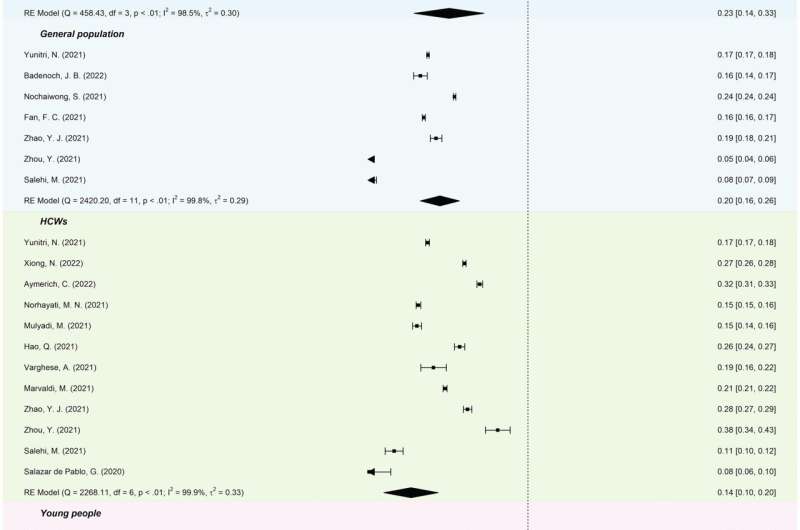This article has been reviewed according to Science X's editorial process and policies. Editors have highlighted the following attributes while ensuring the content's credibility:
fact-checked
trusted source
proofread
Moving on from COVID means facing its impact on mental health, say experts

A new review on the global mental health impact of the COVID-19 pandemic confirms feared increases in depression and anxiety, with leading experts saying little has been done to address what is set to become a mounting mental health crisis.
Young people, pregnant and postpartum people, and those who were hospitalized with COVID-19 appear to be the most impacted, according to the research published in Frontiers of Psychiatry on March 8th.
Led by the University of Sydney's Matilda Center for Research in Mental Health and Substance Use, in collaboration with the Australian National University's Center for Mental Health Research, the review drew conclusions from screening more than 6,000 individual pieces of research.
Professor Maree Teesson said while many want to believe we're "back to normal" in Australia, the statistics show heightened levels of mental ill health that are hard to ignore.
"What worries me is that rather than having an intense recovery phase in Australia we've had further crises, including marked increases in costs of living and natural disasters, all of which we know exacerbate mental health problems," said Professor Teesson, senior author and Director of the Matilda Center.
"If we don't act to implement holistic strategies now, particularly for young people, we risk having a whole generation at a long-term disadvantage," said co-lead author and University of Sydney Ph.D. student Scarlett Smout.
The umbrella review is the first to assess the wide range of international mental health research conducted during the pandemic to untangle the longitudinal mental health impact. Following this, the researchers also collated the results from high-quality studies and used statistical methods (a meta-meta analysis) to identify overall effects.
Research fellow and co-lead author Dr. Marlee Bower, also of the Matilda Center, said, "Using the most rigorous methods and including only the highest quality evidence, our review is the first-of-its-kind to paint an accurate and holistic picture of current science on the mental health impacts of COVID-19."
The review found:
- Evidence of significant increases in depression and anxiety compared to pre-pandemic levels.
- Rates of probable anxiety and depression were 24.4% and 22.9% in general populations, but up to 41.1% and 32.5% in vulnerable populations during the pandemic period.
- Rates of stress, psychological distress and PTSD/PTSS symptoms were 39.1%, 44.2%, and 18.8%, respectively during the pandemic period.
- Evidence that adolescents, pregnant and postpartum people, and those hospitalized with COVID-19, experienced heightened adverse mental health effects.
In May 2022 Australia's Mental Health Think Tank released the Youth Recovery Plan, which makes actionable recommendations on how to remediate the mental health impacts of COVID and other crises on young people.
It includes evidence-based recommendations to address the three key drivers of poor youth mental health: financial stress, disconnection and lack of access to mental health care.
However, senior author of the new review and Chair of the Think Tank Professor Maree Teesson said minimal progress has been made by governments in these areas.
Notably one of the Plan's recommendations has been enacted in part: the Australian Government has increased the number of Commonwealth supported places for degrees in mental health related professions.
"However, there have been no meaningful changes to income support schemes such as youth allowance and jobseeker, aside from a $1.77 per day increase to keep up with inflation, despite skyrocketing costs of living," said Professor Teesson.
The authors hope the new review will focus ongoing attention and investment in the mental health of groups that need it the most, echoing the World Psychiatric Association's call for continued funding for mental health services despite COVID-19 related strains on global government budgets.
The researchers acknowledge some limitations to the review including considerable variability in findings from included research, meaning the estimates provided by the meta-meta-analysis have some degree of uncertainty. Authors highlight the pervasiveness of poor-quality research, identified through a gold standard appraisal process. While they were able to account for this in the analysis, they emphasize the need for greater quality control in mental health research moving forward.
They also suggest more research is needed into sub-groups likely affected by restrictions and lockdowns such as children and people experiencing housing issues, as well as into the impact of vaccination on mental health.
More information: Marlee Bower et al, A hidden pandemic? An umbrella review of global evidence on mental health in the time of COVID-19, Frontiers in Psychiatry (2023). DOI: 10.3389/fpsyt.2023.1107560


















